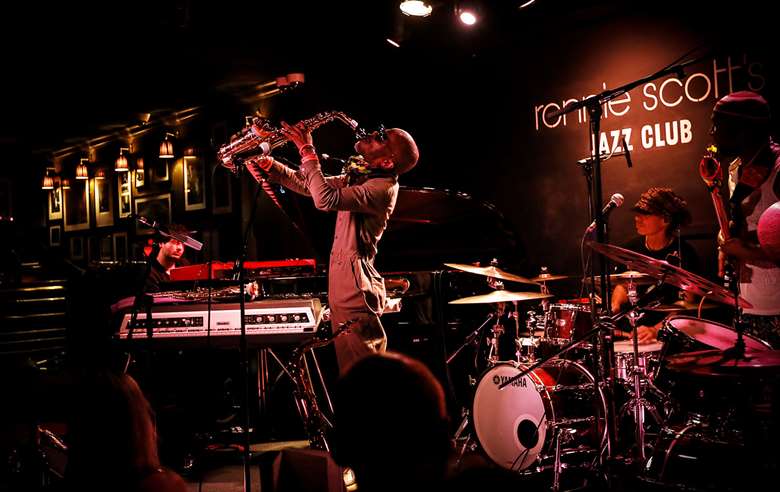Jowee Omicil’s Elements electrify at Ronnie Scott’s
Kevin Le Gendre
Thursday, June 6, 2024
The sax firebrand blew up a storm on his recent visit to Frith Street, London

Carrying several horns, wearing dark glasses and a grey jump suit, Jowee Omicil brings to mind Rahsaan Roland Kirk as he ambles to the stage. While multi-reedist is an apt moniker for the Haitian-Canadian it should be noted that he is in that select group of saxophonists who also play trumpet. A few years ago at this same venue Marcus ‘Tennishu’ Tenney of Butcher Brown left audiences gasping when he switched between the two instruments and there is a similar effect tonight, except that Omicil covers a wider range of timbres by using alto, tenor and soprano sax, bass clarinet, EWI, wood flute and piccolo. Like Kirk, he blows a lot on a lot of things.
The result is an abundance of ideas as well as sounds because the music Omicil is playing has the profound political and cultural premise of the 1791 Haitian revolution, as can be heard on his excellent current album Spiritual Healing Bwa Kayiman Freedom Suite. In keeping with the title Omicil gives the whole performance a sense of ritual, remembrance and emotional uplift that has faint echoes of the landmark freedom suites of Max Roach and particularly Sonny Rollins insofar as the music is a continuous outpouring of entwining rhythms and themes. Two kit drummers (Franck Mategari, Dylan Choisi), electric bass (Jendha Manga) and keyboards (Cenk Esen) lend the work a heady, at times intoxicating density as percussive layers continually stack up, with everything being as loose as one would expect from a performance that does feel delivered on the fly, directed by Omiicil’s frequent changes of instrument.
The low gurgle of the bass clarinet, the high sweep of the soprano and the warm muffle of the trumpet become primary elements that are effectively framed by gyrating syncopations and grainy sustained chords that are often heavily distorted. If the set drifts through a number of tonalities and meters then it also snaps hard into startlingly tight, iron-fisted grooves that are a unique hybrid of funk and Caribbean folk, and the nodding of heads at the bar makes it clear that amid Omicil’s desire for contemplation there is still a current of dance, which could be considered another form of healing. In any case when he walks through the audience, blowing into people’s ears and also exchanging a few words the formal artist-audience barrier is comprehensively swept away and the sense of bonding between Omicil and the crowd is strengthened by a rousing call and response to which there are no voices of dissent. We all willingly join the chorus and also clap hands to expand the rhythm section.
Omicil, whose strongest suit is arguably his soprano, from which he draws a beautifully misty, almost bird-like tone, allied to phrasing that carefully balances restraint and flourish, is a highly engaging personality whose freestyle rapping is not devoid of bright, sassy humour. Yet the foundation of the performance remains a deeply serious one. The soul stirring recitals in Creole stem from the artist’s wish to acknowledge his Haitian roots and the sacrifices of his forebears who battled to overthrow European colonial powers and become the world’s first black republic in the 19th century. That resistance, the unbowed challenge, confrontation and relentless energy can be heard in particular when Omicil duets with each member of the band in turn, and the intensity of the action could not be more in tune with the political-cultural subject matter. It is the other story of Haiti the mainstream press rarely tells.


